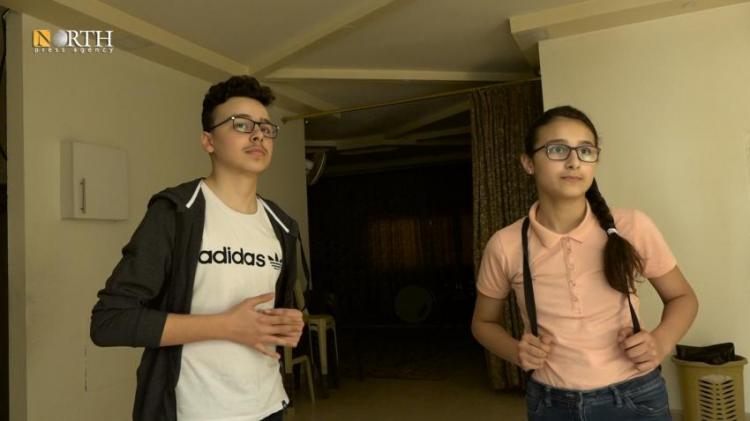Dana Hasan
“Music has a hidden secret. You cannot see it, but it affects you and leaves a great impact on your life,” says 15 – year – old Jan Shawkat from the city of Qamishli. Jan has played the piano since he was less than six years old, and now he is a member of the Rojava Orchestra Institute for Children.
Rojava Orchestra Institute for Children was established in the city of Qamishli, in September 2016. It is the first children’s musical academy in the region, where many children between the ages of 7 and 16 enroll and receive both theoretical and practical music lessons.
The Art and Culture Board of the Autonomous Administration of North and East Syria provided the institute with musical instruments, some of which are new to the region like the cello and the double bass.
In addition to playing the piano , Jan also creates catchy music pieces, the first of which he wrote at the age of ten. Besides being a pianist in the Rojava Orchestra, Jan also supervises drums courses at the institute.
Jan’s 13 – year – old sister Maya, has played the violin since she was eight.
“I wanted to learn how to play the violin when I saw the students at the Classic Center, where Jan started his first piano courses. Now I am a member at the Rojava Orchestra,” Maya told North-Press.
Big Events
Jan’s participation in the orchestra enabled him to experience many important events, the most exciting of which was when they virtually joined the Vozes Orchestra from the Spanish city of Barcelona for a concert on May 30th, 2017.
“That was the most amazing thing I have ever experienced in my life. It encouraged me to practice harder,” Jan said.
It’s no secret that the war in Syria had a negative effect on the old and young, and children got their share, too.
“We received an invitation from the Arabs Got Talent TV Show to perform in Lebanon. It was a great chance for us – the Orchestra group- to show the world our talents. However, the situation of the country and the ages of the Orchestra’s members impeded our participation,” Jan told North-Press.
Difficulties and challenges
The piano is one of the rarest musical instruments in the region, and the fact is that it is difficult to maintain.
“One of the greatest challenges I face is fixing the piano I have at home. It has been broken for a long time, and I cannot find spare parts nor someone to fix it. My teacher at the orchestra institute sometimes helps me in dealing with this problem,” says Jan.
Likewise, Maya says that she has to deal with some discordant sounds from her violin because some violin parts are not available. She says that her violin is not an original one, and that she cannot find a good quality one here.
“In the beginning, I faced some challenges in playing the violin. I couldn’t move my fingers swiftly, but as I practiced I managed to play well,” Maya told North-Press.
Lava Ekko, Jan and Maya’s mother, is a sports teacher and a women’s football coach for al-Jihad team. She says that music opened the minds of both of her children, and that their taste in music, whether international or eastern, has become more refined.
“Music never affected their studies. On the contrary, they became more active and excelled in school,” she added.
Dreams
According to Jan, those who play music can improve the level of consciousness and help to make the world better.
“My dream is to play the piano professionally and teach children how to play,” he added.
Maya wishes to study medicine and become a doctor, and continue playing the violin.
“My dream was realized in them, and I feel so proud when I see Jan and Maya performing on stage,” Ekko said.
“It is different”
On the other side of the Tigris river lives Hajar Ibrahim, who used to be a member in the Rojava Orchestra before his displacement. Ibrahim escaped the Turkish invasion of North and East Syria in October 2019.
Hajar is 16 years old, and plays the piano and the clarinet. He joined the Orchestra group in 2017.
“When the Turkish offensive against the region began to get close to our neighborhood, my father said that we should leave for the Kurdistan Regional Government of Iraq (KRG),” Hajar told North-Press via a messenger app.
Searching for a better place and a better future, Hajar, along with his family, lives in a rented house in the KRG after staying in the Bardarash camp for about a month.
“I stayed without the clarinet for about nine months; that really hurt me. One of our relatives brought my clarinet when he came from Qamishli,” he added.
Hajar says that he used to play music with his friends in the orchestra, but “it is different here.” He finds himself playing alone, though sometimes his brother Diyar, who plays the cello, joins him.
There are many other children like Hajar, who had to leave everything behind and flee the terror of war. History misses some aesthetic treasures that simply vanish during times of war, and while authorities play war, children play music.

